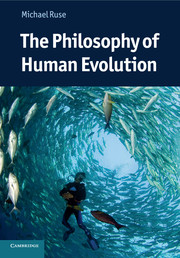1 - Evolutionary biology
Published online by Cambridge University Press: 05 June 2012
Summary
What is “evolution”? If you were asking in the middle of the eighteenth century, the answer would be something to do with individual development. But from about the middle of the nineteenth century the term has meant a gradual process of law-bound development that brought about the world in which we live, especially the world of organisms, animals, and plants (Richards 1992). We usually add that we mean a natural process, that is something where supernatural forces like God play no direct role. Often we mean common ancestry, a “tree of life,” although not every evolutionist has believed in such a tree. Today we think more in terms of bushes or sometimes perhaps a very odd tree like the banyan tree, where there are links all over the place.
Early years
The ancient Greeks did not believe in evolution (Sedley 2008). In a way, this seems strange, because the greatest philosophers – Plato (428–348 BCE) and Aristotle (384–322 BCE), in particular – saw this world of ours as one of change and motion. But when one person, the Sicilian pre-Socratic philosopher Empedocles (490–430 BCE), did suggest something along developmental lines, Aristotle criticized him severely. The reason is simple. The Greeks saw the world as designed, as put together for purposes, for ends (Ruse 2003). Organisms are the things in the world that more than any other exhibit what Aristotle called “final causes.” If you want to understand something like the hand or the eye, then you must ask not merely what the forces making them were, but what is the reason for their existence. Hands and eyes are complex things, and could not have come about through mere chance – through the action of blind, undirected law – but require an intelligence of some kind to make them. Hence, evolution – the epitome of blind chance – is impossible.
- Type
- Chapter
- Information
- The Philosophy of Human Evolution , pp. 1 - 38Publisher: Cambridge University PressPrint publication year: 2012

